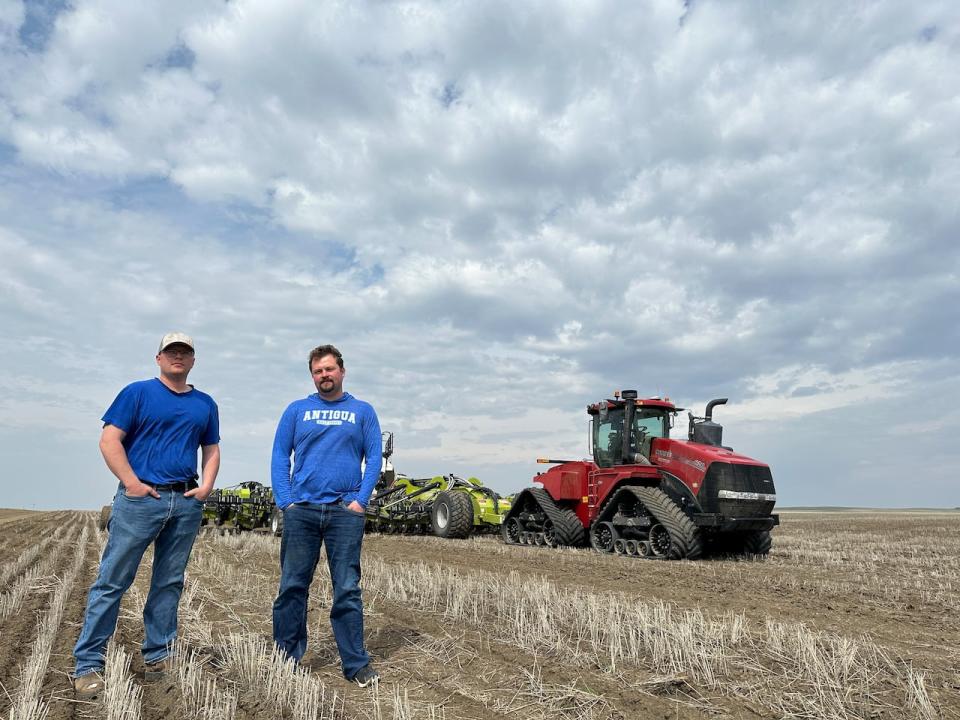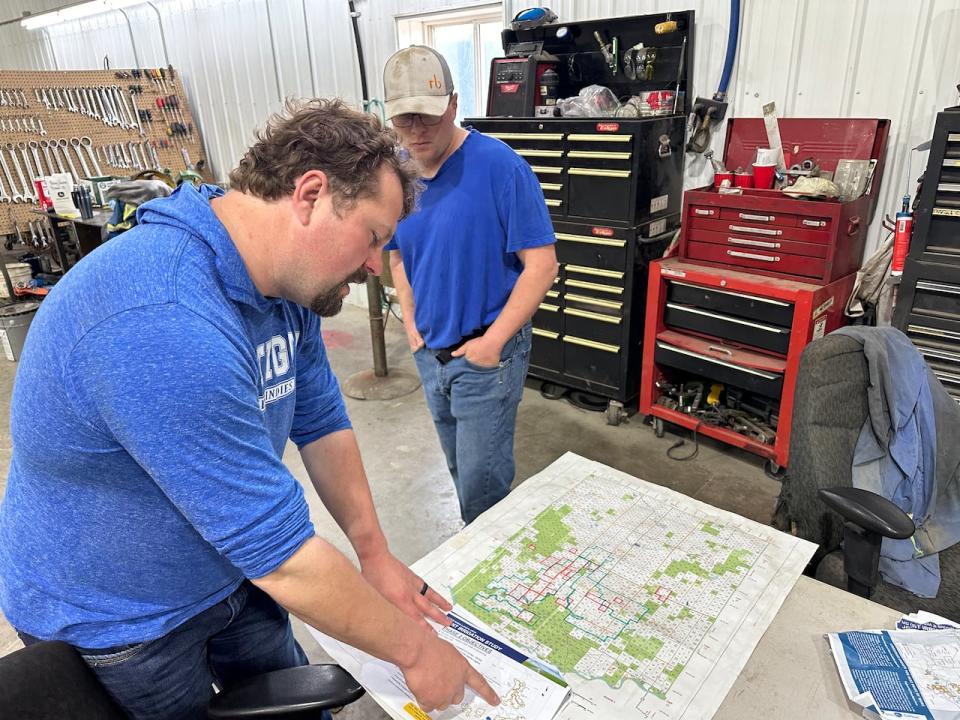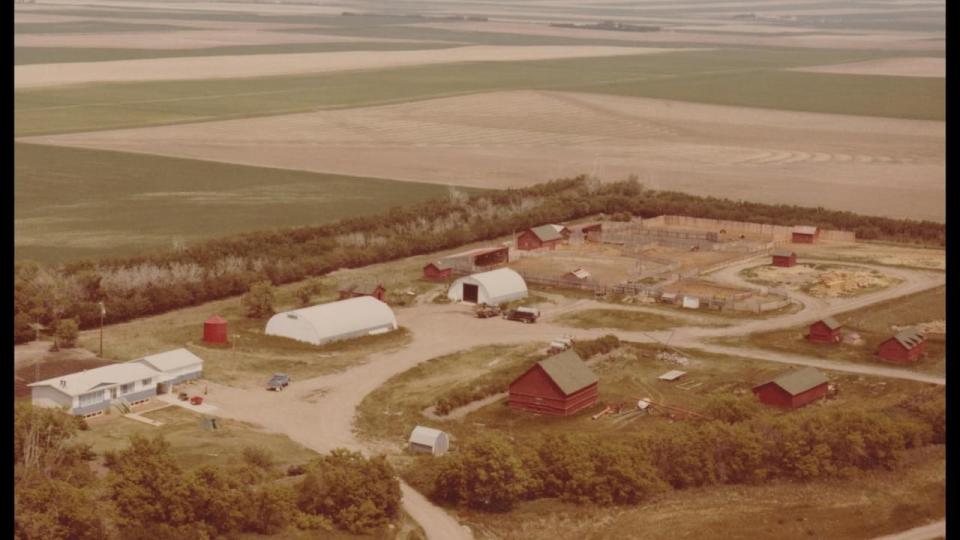This 'dryland' farmer says every spring is a gamble. But he has a plan to improve the odds

Scott Heeg, a municipal district councillor, is a dryland farmer in Acadia Valley, which means he has no access to irrigation and is among the first to see the impact of drought.
As part of our series When in Drought, CBC producer Elise Stolte joined Heeg on a walk through his fields earlier this year. The interview, which begins below with Heeg's thoughts on his young wheat crop, has been condensed and lightly edited.
The grain is up out of the ground, really nice.
With the rain we had, my brother Steve is ready to add extra fertilizer, but I don't know. I'm not convinced we're fully out of the drought yet.
They're tough decisions because whatever you really do affects the bottom line.
This durum wheat is at an early stage of plant life — the single-leaf stage right now. By the time it hits the four- or five-leaf stage, it's decided within the plant what the yield is gonna be.
But we're talking $65,000 worth of added input, and we're gambling that we're getting another five to six inches of moisture this season. You wanna be cautious, but at the same time, you have to continue to grow your crop insurance numbers because they're definitely getting deflated through these four years of drought that we've had out here.

How do you describe where your farm is?
Our farm is north of Medicine Hat — about an hour and a half drive. My brother and I own or rent a little over 10,000 acres of crop land.
If you look on the map, Acadia Valley is a tiny little county here surrounded by huge Special Areas. That's because, during the drought of the '30s, all these counties were going broke. The government had to step in.
But here in Acadia Valley, we have good quality soil. The little bit of moisture we did get was able to grow the farmers a crop and they could survive.
Growing up, I never doubted that I wanted to stay and farm. My brother and I started buying land in our early 20s and that sets it in stone, basically. Once you've got an investment like that, you kinda wanna see it through until you can retire, if you're fortunate enough, or things go real bad.
You've been coming through a bad drought. What's that been like?
For us, the drought on our farm really set in in 2020. That was the first year that there was a noticeable difference. And it got worse.
We'd always notice a fairly good start — whether from some early spring rains or a good bit of snow. But then we'd hit the middle of June and rain just shut off. For the last couple summers, we'd go to 30 C at the end of May and that heat wouldn't leave. Or we'd get a hot wind and it would just fry these crops right down to nothing.
It's just one giant disappointment. You need good neighbours and a social life to get through it because, you know, if you just sat out here and watched it happen, you'd go insane.
How do we cope? I visit a neighbour, have a couple cocktails. My brother, he likes the camping life. We try and just get away from it — out of sight, out of mind. Fortunately out here we have a pretty strong community.

I'd like to ask about the irrigation proposal being considered for this area, too. Is there somewhere we can look at some maps?
We've got a table set up in the shop. Let's head back.…
So this is the county map and highlighted in green is the project on the north side of the river, about 50,000 acres. The water would get lifted out of the Red Deer River at the Bindloss bridge pump site, pumped up into a holding pond, then gravity fed via canal for about half of the project area. The rest is pressure pipe off the canal.
The south side of the river, in the Special Areas, is another 50,000 acres, and its all pressurized pipe.
We're still working on a price tag for it. There's a lot of work that still needs to be done but we're hoping to at least get our foot in the door and make some progress.
It would be huge, huge for us and for this community.
The entire area has been losing population for years. If we brought in infrastructure like this, operating it would require more help. And there would be so many spinoffs.
I always tell people who are doubtful, I say, I'll charter a bus. We'll go for a drive from Medicine Hat to Lethbridge and you just see what irrigation does for an area. On that highway, you have four huge new John Deere dealerships and that would not exist without irrigation.
In Western Canada, people survive by farming a huge number of acres. That's how they sustain themselves. Well, we don't want to lose more farms through that in Acadia Valley. This irrigation project would give a new option to make our farm sustainable.
More than anything, I want my kids to be able to take over this place and continue to grow it.

That sets up my question on climate change. Do you want to walk me through your thoughts on how that might impact this project?
I know people who talk about climate change are concerned we won't have the water in the river to irrigate in the first place.
But with this project we have very intelligent people involved, a company out of Calgary called WaterSMART. They look at historical flow rates and walk us through the worst drought situations. So far, no one has presented a study that says we have no water to irrigate with. There's always at least a minimal amount.
My personal beliefs on the whole topic: [the weather patterns are] very much cyclical.
Some people are posing [climate change] as a complete disaster. It's not that way for me. People have farmed this area for a long time and they've come through some pretty bad years.
As far as climate change goes, maybe there's some change in the weather patterns. But I don't believe we're drying up. Your precipitation events might be more, and your drought might be worse. But we're gonna get back into rain out here. That's not gonna change. It'll come back.
Stories about drought in Alberta
Click or tap on a water drop icon to see coverage from that area.


